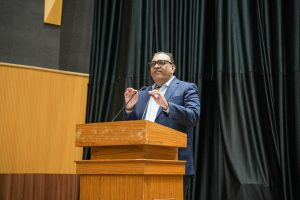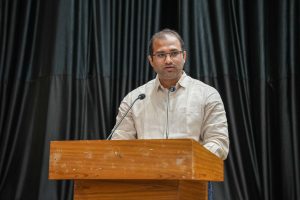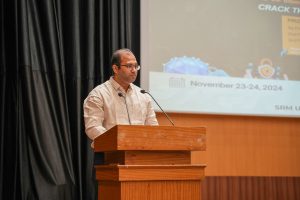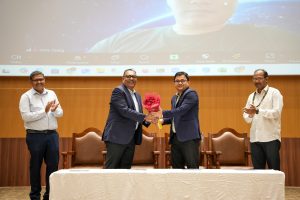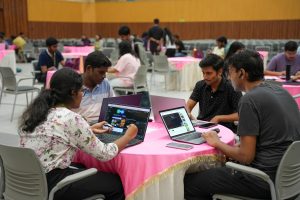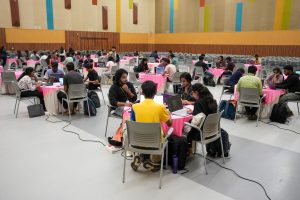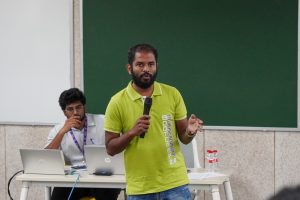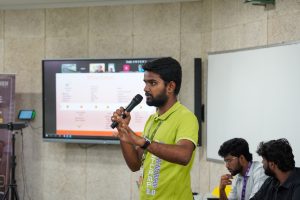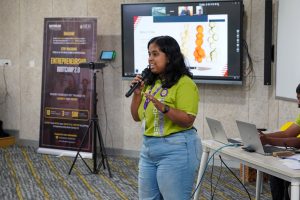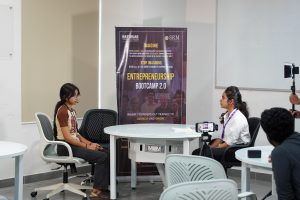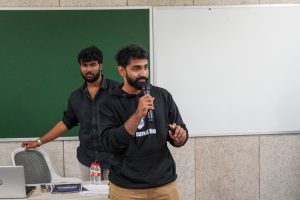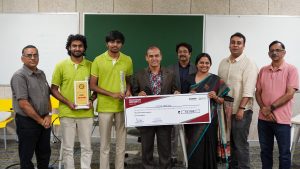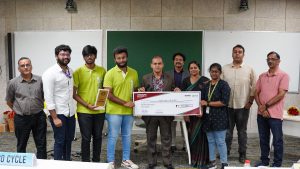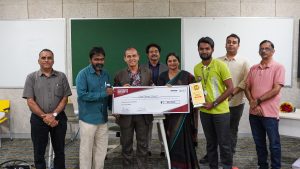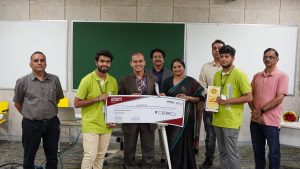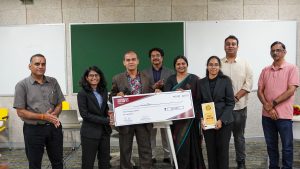SecureX Hackathon: Students Shine at the Cybersecurity Codefest
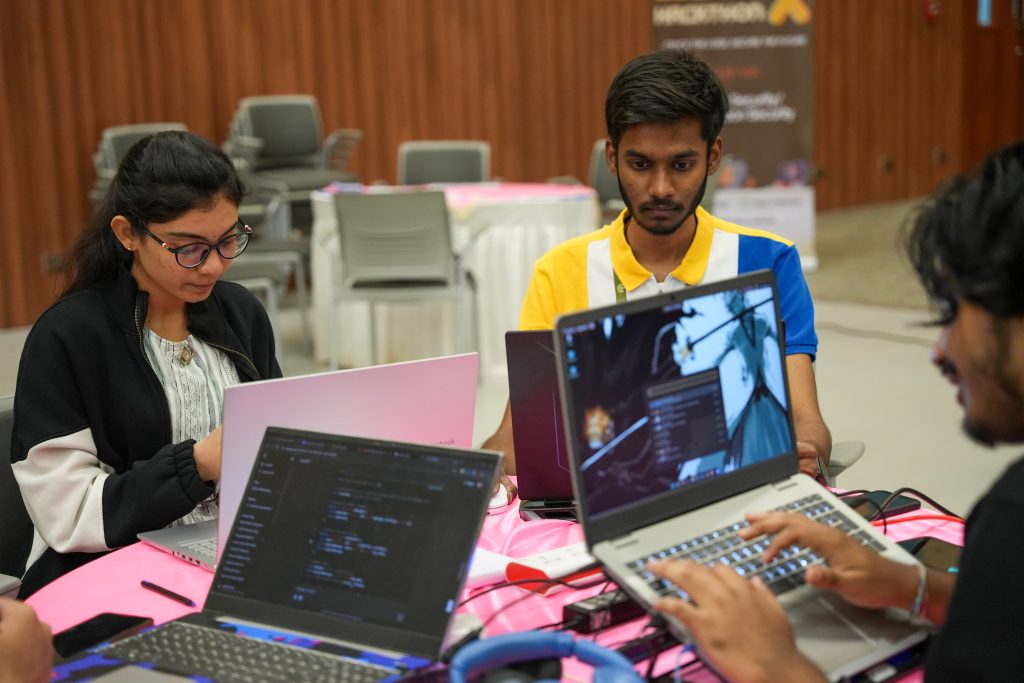
The Cybersecurity Hackathon “Crack the Code & Secure the Future”, held at SRM University-AP in collaboration with BSI Learning on November 23-24, 2024, marked a significant achievement, bringing together students, professionals, and experts in the field to tackle real-time cybersecurity challenges. The event provided participants with hands-on expertise and the opportunity to design innovative solutions aimed at addressing the growing concerns in the field of cybersecurity.
The hackathon opened with an inspiring speech by the Dean of Research Prof. Ranjit Thapa, who emphasised the university’s dedication to fostering innovation and research from the very beginning of a student’s academic journey. He highlighted the importance of the event, stating that all participants would receive certificates of appreciation, reinforcing the university’s commitment to recognising and motivating talent.
Mr Vipul Rastogi, the keynote speaker, expressed his admiration for SRM University-AP, particularly impressed by the institution’s provision of seed funding for undergraduate students, something he had not encountered elsewhere. Mr Vipul, a seasoned cybersecurity expert, stressed the growing demand for cybersecurity professionals, citing that 40% of cybersecurity positions remain vacant due to the rapidly expanding threat landscape.
Mr Chris Chan, the Cybersecurity Education Lead and Consultant at BSI Learning, Australia, provided valuable insights into the intricacies of cybersecurity, including areas such as penetration testing, cloud security, governance, risk, and compliance. Mr Chan also elaborated on the importance of user education, vulnerability management, and organisational resilience in mitigating cybersecurity risks.
Participants, divided into 22 teams with 81 members, were challenged to design and implement innovative solutions addressing one of the following key cybersecurity areas: Prevention and User Education, Detection and Monitoring, Response and Mitigation and Policy Compliance and Business Continuity.
The event focused on fostering a collaborative environment where participants could experiment, innovate, and deliver real-time solutions to cybersecurity problems. Team Tech Blazers won the first prize of 800 AUD, while Team Secure Ops and Team Soul Society won the second and third place of 500 AUD and 200 AUD respectively. All teams contributed actively to providing outstanding solutions, adding a competitive yet educational aspect to the hackathon.
The event concluded with a vote of thanks to Vipul Rastogi, Chris Chan, and all participants for their valuable contributions. The Cybersecurity Hackathon was a resounding success, showcasing the power of collaboration, innovation, and secure solutions in addressing the pressing challenges of today’s digital world.
The university looks forward to continuing such initiatives, further strengthening its role as a leader in research and innovation in the academic community.
- Published in CSE NEWS, Departmental News, News
Advancements in Optical Technologies: Paper by Dr Devdutt Tripathi
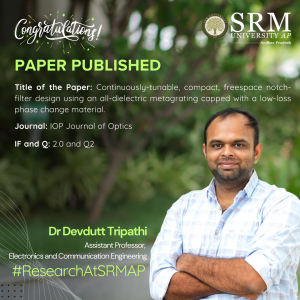 This research paper titled, “Continuously-tunable, compact, freespace notch-filter design using an all-dielectric metagrating capped with a low-loss phase change material” by Dr Devdutt Tripathi, Assistant Professor, Department Electronics and Communication Engineering explores the use of active metasurfaces combined with phase change materials (PCMs) to enhance optical technologies thereby enhancing optical technologies across various sectors including telecommunications and imaging sectors.
This research paper titled, “Continuously-tunable, compact, freespace notch-filter design using an all-dielectric metagrating capped with a low-loss phase change material” by Dr Devdutt Tripathi, Assistant Professor, Department Electronics and Communication Engineering explores the use of active metasurfaces combined with phase change materials (PCMs) to enhance optical technologies thereby enhancing optical technologies across various sectors including telecommunications and imaging sectors.
Abstract:
Active metasurfaces utilising phase change materials (PCMs) are currently under investigation for applications in free-space optical communication, optical signal processing, neuromorphic photonics, quantum photonics, and compact LiDAR. Attention has now turned towards novel PCM like Sb2S3 which exhibit lower optical absorption and reasonable values of refractive-index contrast in comparison to traditional data-storage PCM. We propose and numerically study the class of all-dielectric metagratings capped with low-loss PCM and predict the possibility of continuously tunable resonances whose quality factors degrade gracefully during the amorphous-to-crystalline phase transition of the PCM. Specifically, we consider the CMOS-compatible silicon-nitride on silica substrate material platform for simple and asymmetric metagratings (in particular, the symmetric-broken dimerization) and Sb2S3 capping. Our numerical study predicts that notch-filters operating around the 1550 nm NIR wavelength window can be achieved with tuning range of over 76 nm with Q-factors ranging from 784 (amorphous-phase) to 510 (crystalline-phase) (a degradation in Q of about 35%) and insertion loss of about 0.9 dB. These performance figures are a significant improvement over previously published designs utilizing data-storage PCMs and other traditional notch-filter mechanisms. We examine the influence of grating dimerization and geometrical parameters on performance metrics of the notch-filter and predict the possibility to trade-off rejection-band and in-band spectral transmission properties. Lastly, we perform a study of an all-optical phase change mechanism. Our study is promising for the miniaturization of tunable notch-filter based optical systems.
Explanation in Layperson’s Terms:
This research explores the use of advanced materials called metasurfaces (engineered materials especially in a 2D thin film structure), combined with phase change materials (PCMs- Semiconducting alloys of the Chalcogen family), for improving already existing and emergent technologies such as Optical communication, LiDAR (an acronym for Light Detection and Ranging), and Quantum photonics. Metasurfaces are thin layers with typical thickness ranging from a few hundred nanometers to several micrometers that can manipulate light in unique ways. In this study, the focus is on a specific PCM, Antimony Trisulphide (Sb2S3), which exhibits lower light absorption and better control over how it interacts with the incident light compared to traditional PCMs such as GST225 (Germanium Antimony Telluride) used in data storage. We propose a new design of metasurfaces, called metagratings, that can be “tuned” by changing the state of the PCM between amorphous and crystalline forms. The study predicts that these metasurfaces can be used to create notch filters, which block specific wavelengths of light, particularly around the 1550 nm range commonly used in fiber optics. When the PCM switches states, the filter can shift by 76 nm, with only a minor decrease in performance, about 35%. The study also looks at how small changes in the shape and structure of the metagratings can fine-tune their performance, allowing for a balance between filtering strength and light transmission. Overall, this research points to a promising way of miniaturizing and improving tunable optical filters for a range of high-tech applications.
Practical Implications:
This research has several practical implications:
1. Optical Communication: It can improve free-space optical
communication by offering tunable filters to enhance signal clarity and reduce interference.
2. Miniaturized LiDAR: Smaller, more efficient LiDAR systems for autonomous vehicles and 3D mapping can be developed.
3. Optical Signal Processing: Faster, more efficient photonic circuits could be created for data processing and telecommunications.
4. Neuromorphic and Quantum Photonics: The tunable metasurfaces can support advanced computing and quantum technologies by precisely controlling light.
5. Energy Efficiency: Sb₂S₃ uses less power than traditional materials, making devices more energy-efficient.
6. Sensing and Imaging: It can improve sensors and imaging systems by allowing more precise wavelength control.
7. CMOS Compatibility: The research can be integrated into existing semiconductor technologies, facilitating mass production.
Collaborators:
1. Prof. Hardik S. Vyas: Assistant Professor in Department of ICT, PDEU, Gandhinagar, Gujarat.
2. Prof. Ravi S Hegde, Associate Professor in Department of Electrical Engineering, IIT Gandhinagar, Gujarat.
Future Research Plans:
Research in Metasurface can be explored towards various applications such as imaging, microscopy as well as communication.
Article Link:https://iopscience.iop.org/article/10.1088/2040-8986/ad80a6
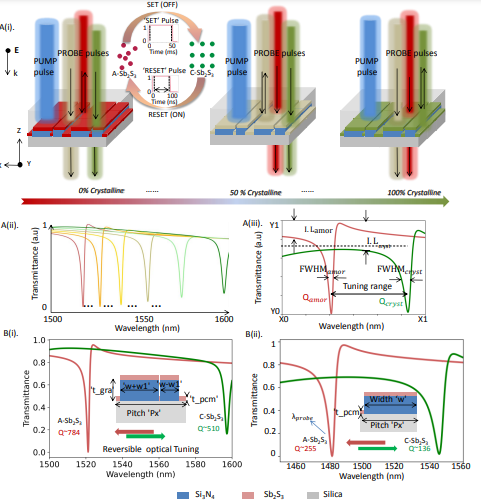
- Published in Departmental News, News, Research News
Enhancing Atmospheric Water Harvesting for Sustainable Water Solutions
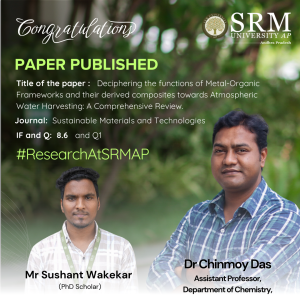 As water scarcity becomes an increasingly pressing issue, innovative solutions like atmospheric water harvesting (AWH) are being explored to provide sustainable access to fresh water. Dr Chinmoy Das, Assistant Professor from the Department of Chemistry and his research scholar Mr Sushant Wakekar have in their research paper titled, “Deciphering the functions of Metal-Organic Frameworks and their derived composites towards Atmospheric Water Harvesting: A comprehensive Review” analysed the crucial role of metal-organic frameworks (MOFs) and their composites in enhancing the efficiency of AWH systems.
As water scarcity becomes an increasingly pressing issue, innovative solutions like atmospheric water harvesting (AWH) are being explored to provide sustainable access to fresh water. Dr Chinmoy Das, Assistant Professor from the Department of Chemistry and his research scholar Mr Sushant Wakekar have in their research paper titled, “Deciphering the functions of Metal-Organic Frameworks and their derived composites towards Atmospheric Water Harvesting: A comprehensive Review” analysed the crucial role of metal-organic frameworks (MOFs) and their composites in enhancing the efficiency of AWH systems.
Abstract
To address water scarcity globally, recently atmospheric water harvesting (AWH) has emerged as an intriguing and sustainable solution. This comprehensive review critically investigates how diversity in metal-organic frameworks (MOFs) and their composite materials shapes the effectiveness and practicality of AWH technologies. These materials range from pristine MOFs to functionalized MOFs-based composites to attain the sophisticated hydrophilic behavior to perform as water harvesters. The multifaceted effects of MOFs and their composite materials on the kinetics of sorption and condensation, the feasibility of water uptake and release, the overall performance of the materials, the theoretical understanding of water uptake, and various instrumentation techniques have been demonstrated in this comprehensive review. It contributes to the ongoing discourse on sustainable water sourcing by emphasizing the pivotal role of materials diversity in shaping the future of AWH technologies.
Explanation of Research in layperson’s terms:
This review article explains how AWH technology, which captures water from the air, could provide sustainable solutions for water scarcity. We focus on advanced materials called MOFs and their ability to improve AWH efficiency. By analyzing different types of MOFs and MOF-based composites, we explore how they enhance water absorption and release, potentially making AWH more practical and effective for real-world use.
Practical/Social Implications of the Research:
This technology could have far-reaching social impacts by offering a reliable water source for communities in arid or remote areas, reducing reliance on traditional, often costly water sources, and strengthening resilience to climate change.
Future Research Plans:
To design and synthesis a material which can work with a minimum relative humidity (%RH) and design a suitable prototype for it.
Link to the Article
https://www.sciencedirect.com/science/article/pii/S2214993724003002

- Published in Chemistry-news, Departmental News, News, Research News
Entrepreneurship Bootcamp 2.0: A Journey of Innovation
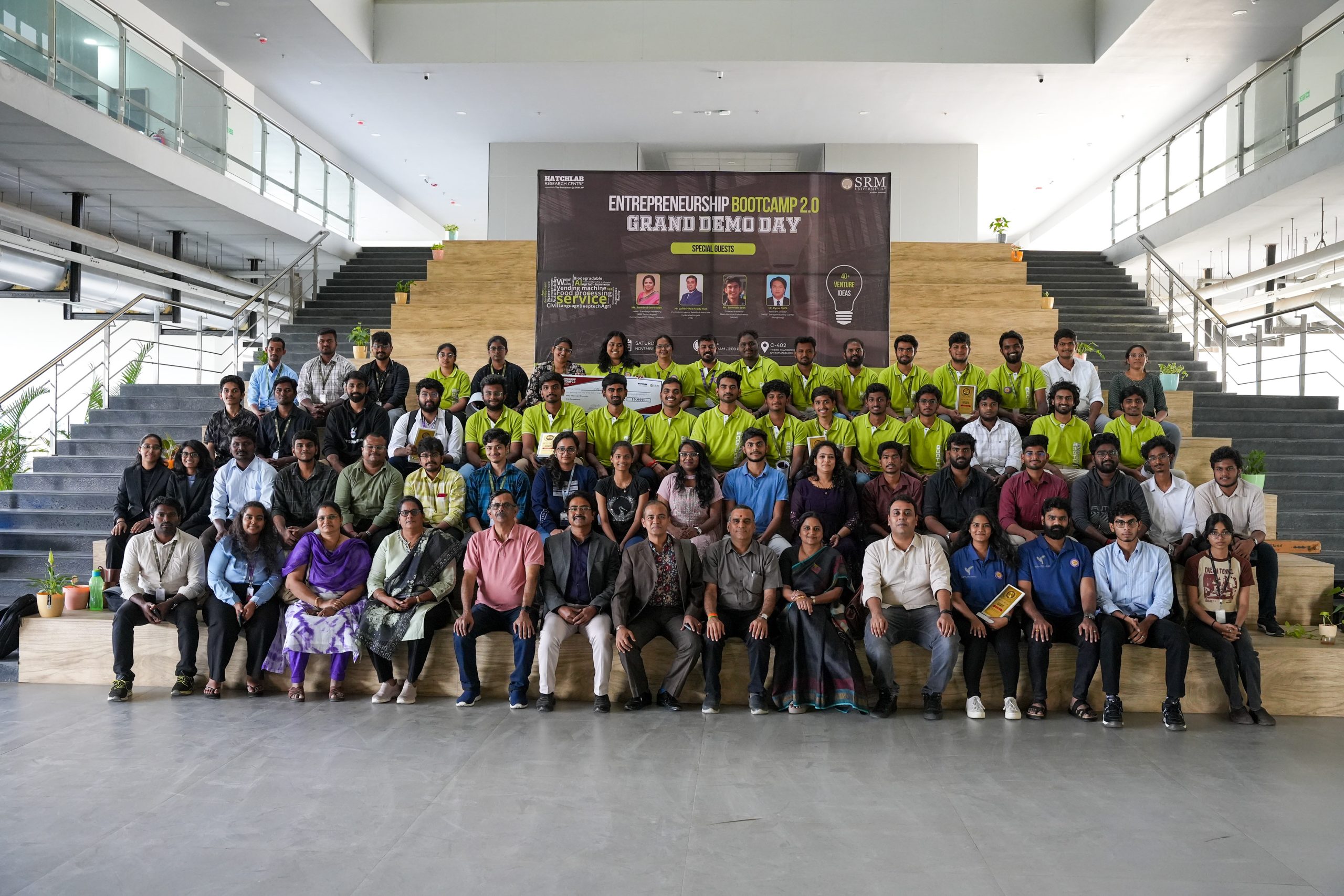 SRM University-AP’s Entrepreneurship Bootcamp 2.0 concluded in style with a vibrant Demo Day, where budding entrepreneurs gathered with innovative ideas, driven by their passion for building successful ventures. The event, held on the university’s Amaravati campus, marked the culmination of a ten-week intensive entrepreneurship training programme designed to foster innovation among students.
SRM University-AP’s Entrepreneurship Bootcamp 2.0 concluded in style with a vibrant Demo Day, where budding entrepreneurs gathered with innovative ideas, driven by their passion for building successful ventures. The event, held on the university’s Amaravati campus, marked the culmination of a ten-week intensive entrepreneurship training programme designed to foster innovation among students.
The Demo Day featured an elite panel of mentors and investors, including Ms Sreedevi Devireddy, Head-Branding & Marketing, ASIP Technologies and Former Head of VDC Gitam University; Mr Cyrus Choi, Assistant Director of the Entrepreneurship Centre at Hong Kong University of Science and Technology (HKUST); Mr Lalith Mitra Reddy Kolli, Portfolio & Investor Relations Associate at Hyderabad Angles; Mr Samridh Seth, Founder, Black Komodo Investments, Dubai along with Prof. Sidharth Tripathy, Director-Entrepreneurship & Innovation, Mr Udayan Bakshi, Associate Director-Entrepreneurship and Innovation, Dr Krovi Raja Sekhar, CEO, Hatchlab Research Centre and Mr Pankaj Belwariar, Director-Communications of SRM University-AP.
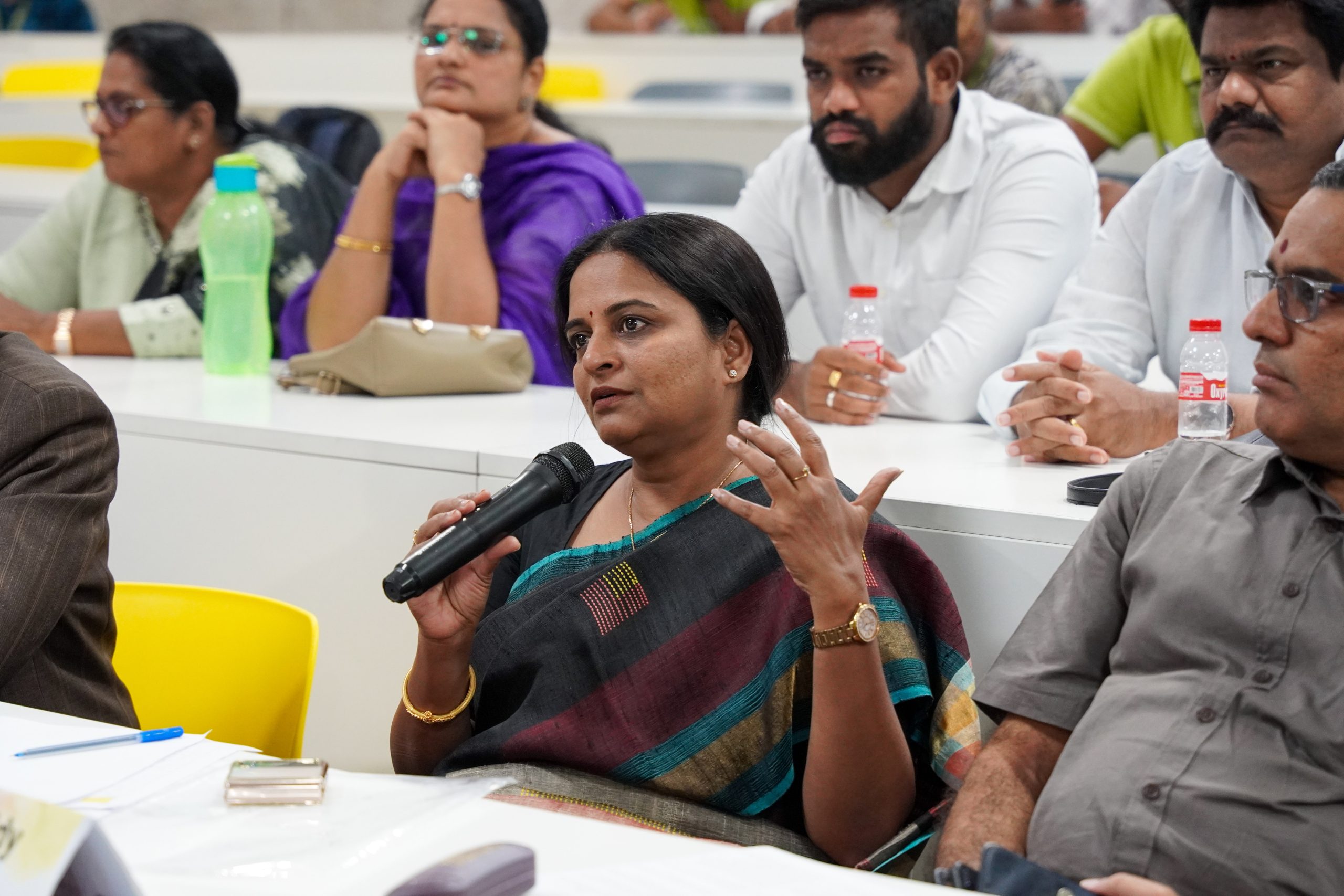 The dynamic presentations by the participants showcased their innovative ideas, business models, and go-to-market strategies. The esteemed panel offered constructive feedback, enabling participants to refine their ventures further. “We approached you as living start-ups, and you rose to the occasion, demonstrating the hunger and drive of true entrepreneurs. Keep that fire alive,” Ms Sreedevi applauded the students.
The dynamic presentations by the participants showcased their innovative ideas, business models, and go-to-market strategies. The esteemed panel offered constructive feedback, enabling participants to refine their ventures further. “We approached you as living start-ups, and you rose to the occasion, demonstrating the hunger and drive of true entrepreneurs. Keep that fire alive,” Ms Sreedevi applauded the students.
The Entrepreneurship Bootcamp 2.0 engaged 85 participants, selected from over 356 applicants after a competitive selection process. Curated by Prof. Sidharth Tripathy, a Harvard alumnus and the Director-Entrepreneurship & Innovation at SRM University-AP, the bootcamp comprised 14 interactive sessions covering ideation, business modelling, and go-to-market planning. The programme included world-class case studies and hands-on mentoring sessions with global experts.
Participants represented ventures in diverse fields such as Waste-to-wealth innovations, Augmented reality, Automobiles, Food processing, AI and Deep tech, Healthcare, Agritech etc. Of the 16 standout ventures identified during the programme, the top 10 teams received incubation grants of ₹50,000 each.
“This event stands as a testament to the passion and dedication of our students. Their hard work has earned them the incubation opportunity that they truly deserve. These grants will support their entrepreneurial journeys through incubation and acceleration at the Hatchlab Research Centre, SRM University-AP’s premier business incubator,” said Prof. Tripathy.
- Published in IDEA NEWS, Innovation, News


